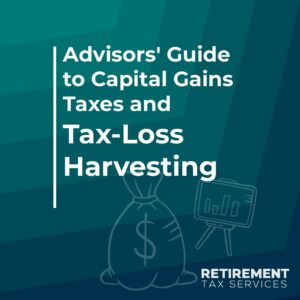Background: IRS Fraud Themes
Fraud is an unfortunate fact of life. Taxes are not an exception to the prevalence of identity theft today.
In fact, every year the IRS puts out their own “Dirty Dozen” list of scams and frauds for taxpayers to watch out for.
As a Financial Advisor, you are in a great position to help your clients—if you know what to watch out for. Help educate them, as well.
In this article, we highlight some of the IRS’s warnings. We also review other areas of concern under the umbrella of taxes.
The goal is providing ways to help your clients reduce their risk of becoming a victim.
Phishing continues
At this point, we have all seen phishing attempts. It may seem like old news, but taxpayers continue to fall victim to these scams. So, we have to keep talking about them.
According to the IRS’s report, these attempts happen frequently and across many different platforms. Phishing attempts have reportedly occurred over the phone, through text messages, and (increasingly) over social media.
Taxes are overwhelming, confusing and frustrating. This makes it an appealing topic for potential fraudsters.
Consider including education around cybersecurity and fraud prevention in a client value-add during the year. Specific to phishing, here are some of the reminders that the IRS recommends:
- The IRS typically reaches out to taxpayers by mail first; not by phone or other communications.
- The IRS will at times call taxpayers. However, they will never insist on payment using an iTunes card, gift card, prepaid debit card, money order, or wire transfer.
- The IRS will never request personal or financial information by e-mail, text, or social media.
Often taxpayers don’t know who to go to when they are contacted by the IRS. It doesn’t matter whether it’s a scam or the actual IRS reaching out.
Make yourself a resource to your clients. Let them know they can always contact you. Also remind them that the IRS typically reaches out through a letter first.
If they are ever unsure whether a phone call is from the IRS, recommend they simply hang up and dial the number provided on the letter. This is the same approach they should be taking for communication from their bank.
You don’t have to be the final answer on all things tax-related. You just need to be willing to help them find an answer.
Fake Charities
Especially during the “season of giving,” there are endless opportunities paraded in front of taxpayers for charities they can give to.
Charitable giving is a great thing. It’s something you can proactively work with clients on to make sure they approach it in a tax-efficient way.
However, the IRS warns that this is a common area in which fraudsters try to take advantage of taxpayers.
Taxpayers should be especially cautious when there are natural disasters or other tragedies. Scammers can use this to create a sense of urgency for rushed decisions.
Here are some best practices when it comes to giving:
- Give to charities you know. There is nothing wrong with giving to a new charity, but make sure you take the time to research organizations you are not familiar with.
Especially when charities are reaching out, remind clients that most will be flexible on when and how they receive donations. Pressure to donate immediately is a red flag.
BONUS: the IRS actually has a website for looking up Tax-Exempt Organizations. Consider sending the link to your clients in your next newsletter.
- Double-check the exact name and address of the charity. Scammers will often use similar names to well-known organizations. Verify that you are giving to the cause you want to support.
- Be mindful of how a donation is paid. A charity asking for donations by gift card or wiring money is a potential red flag.
- Have a plan. Exceptions come and flexibility to give how and when a client would like is important. However, understanding a client’s intentions and planning ahead will help avoid scams and allow for better opportunities to give tax-efficiently.
Cybersecurity
In addition to scams directed at interactions with taxpayers, there is also a concern about general cybersecurity.
Because of this, the IRS has worked with companies across the private sector to enhance the tools used by taxpayers and tax preparers. This is to reduce the risk of identity theft and improper use of software tools.
There are several steps the IRS has taken in the last year to enhance these efforts. In fact, one of the key recommendations is that all taxpayers use two-factor authentication.
While not all software requires this, it is more and more widely available. It is highly recommended to be used, even if it is optional. This is another great reminder to include in tax-related client communications.
Social Security and Fraud
One very unfortunate area that fraud continues to happen through is social security benefits. Fraudsters at times have been able to set up accounts through the Social Security Administration (SSA) for other people without their knowledge.
Next, they redirect where a victim’s social security payments are sent. Many taxpayers don’t think of Social Security until they are close to claiming it.
Meanwhile, anyone over the age of 18 can create an account with the SSA, regardless of when they will start claiming benefits.
Educate your clients on this and provide them with the information to set up an account. It can be a great value-add and help prevent this type of fraud from impacting them.
Identity Theft
Identity theft is a concern that goes far beyond taxes. But, did you know that the IRS has a program for flagging potential identity theft concerns for taxpayers?
Through the IRS’s e-services, professionals can be designated by clients to access information from the IRS on their behalf. This includes information related to identity theft.
There are hoops to jump through to get this set up for your clients. Regardless, it is possible through using IRS form 8821.
Most financial advisors will need to find a tax preparer to partner with to make this a reality. Consequently, it is worth discussing with the CPAs your clients currently use.
Similarly, you can always explore the tax services offered by Retirement Tax Services. These include monitoring, using IRS Form 8821.
The IRS also has a program for taxpayers at high risk for identity theft. It helps those who are vulnerable to someone else filing a tax return with their social security number, too.
Each year taxpayers can request an Identity Protection PIN (IP PIN). This is a 6-digit number known only to the IRS and the taxpayer as an added level of security.
There is a rigorous identity verification process but it is worth considering for taxpayers at high risk.
Take Action
- Educate your clients. At least annually, include a section in a client communication with reminders about tax scams and the potential for fraud. A year-end tax letter, a 1099 letter, or a client newsletter are great places to include this.
- Help your clients. Pick at least one specific step your clients can take. Next, provide them with the information and tools to get it done.
- Walk them through setting up a Social Security Administration Account. This precaution is a value-add for clients. It could prevent headaches for you, too.
- Help your clients convert to making online payments to the IRS. Paper checks are a prime target for theft and identity theft. So they are more likely to get lost or delayed.
- Start IRS monitoring through Form 8821. This is a bigger commitment from you as the Financial Advisor, but is a huge value-add to clients.
Remember to tip your server, not the IRS.





